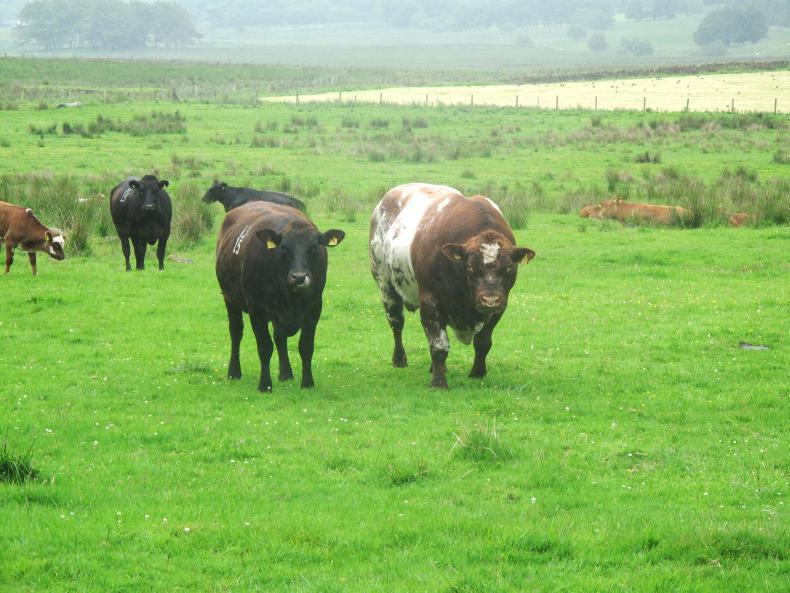Having watched the BBC’s Meat: A threat to our planet documentary aired this week, you have to wonder what the long-term objective really is.
The programme travelled the world, and in particular, showed large-scale farming systems from the Americas that are not representative of agriculture here. For consumers watching, the message was clear – stop eating meat, consume plant-based foods and save the planet.
Many crop growers also rely on animal manures to help maintain soil organic matter
So where would that leave farming in NI? The reason why around 90% of our agricultural area is dedicated to livestock production is because it is not really suited to anything else.
Of course there are some successful vegetable businesses operating on some of the best land, but even then, in a wet autumn, it is difficult to get crops harvested. Many crop growers also rely on animal manures to help maintain soil organic matter – without livestock, the entirety of NI agriculture is pretty much gone.
Many plant-based foods actually have a higher carbon footprint per calorie than meat or dairy
So those promoting an end to livestock farming are effectively wanting to close down our farms. Instead, we would then rely on imports of plant-based foods from around the world. It is a crazy over-simplification of the issues that we currently face.
As pointed out by Professor Alice Stanton at the recent Nuffield Ireland conference, many plant-based foods actually have a higher carbon footprint per calorie than meat or dairy. It is also worth noting the positive role that livestock have in managing our environment and ensuring soils are healthy and able to take in carbon.
Where this land is then properly managed with grazing livestock, it should lead to more carbon being sequestered into the soil
For example, at CAFRE’s hill farm in Glenwherry, Co Antrim, a significant area of poorly performing trees is currently being removed, with the aim to return the land to its natural state of heather, mosses, etc.
Where this land is then properly managed with grazing livestock, it should lead to more carbon being sequestered into the soil. Perhaps some documentary makers might want to do a programme on that.
Read more
Farmers hit back at ‘farmer bashing’ in the media
Plant-based foods have a higher carbon footprint than meat and dairy
Having watched the BBC’s Meat: A threat to our planet documentary aired this week, you have to wonder what the long-term objective really is.
The programme travelled the world, and in particular, showed large-scale farming systems from the Americas that are not representative of agriculture here. For consumers watching, the message was clear – stop eating meat, consume plant-based foods and save the planet.
Many crop growers also rely on animal manures to help maintain soil organic matter
So where would that leave farming in NI? The reason why around 90% of our agricultural area is dedicated to livestock production is because it is not really suited to anything else.
Of course there are some successful vegetable businesses operating on some of the best land, but even then, in a wet autumn, it is difficult to get crops harvested. Many crop growers also rely on animal manures to help maintain soil organic matter – without livestock, the entirety of NI agriculture is pretty much gone.
Many plant-based foods actually have a higher carbon footprint per calorie than meat or dairy
So those promoting an end to livestock farming are effectively wanting to close down our farms. Instead, we would then rely on imports of plant-based foods from around the world. It is a crazy over-simplification of the issues that we currently face.
As pointed out by Professor Alice Stanton at the recent Nuffield Ireland conference, many plant-based foods actually have a higher carbon footprint per calorie than meat or dairy. It is also worth noting the positive role that livestock have in managing our environment and ensuring soils are healthy and able to take in carbon.
Where this land is then properly managed with grazing livestock, it should lead to more carbon being sequestered into the soil
For example, at CAFRE’s hill farm in Glenwherry, Co Antrim, a significant area of poorly performing trees is currently being removed, with the aim to return the land to its natural state of heather, mosses, etc.
Where this land is then properly managed with grazing livestock, it should lead to more carbon being sequestered into the soil. Perhaps some documentary makers might want to do a programme on that.
Read more
Farmers hit back at ‘farmer bashing’ in the media
Plant-based foods have a higher carbon footprint than meat and dairy






 This is a subscriber-only article
This is a subscriber-only article









SHARING OPTIONS: